|
|
|
Sort Order |
|
|
|
Items / Page
|
|
|
|
|
|
|
| Srl | Item |
| 1 |
ID:
085852


|
|
|
|
|
| Publication |
2008.
|
| Summary/Abstract |
The Seventeenth National Congress of the Chinese Party (CCP), held on 15-21 October 2007 in Beijing , Produced some interesting changes to the balance of power among different factional groups in Chinese politics.
|
|
|
|
|
|
|
|
|
|
|
|
|
|
|
|
| 2 |
ID:
126364
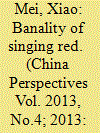

|
|
|
|
|
| Publication |
2013.
|
| Summary/Abstract |
This paper examines the interaction between Chongqing's Red culture programme (2008-2012) and the practices of Singing Red by retiree participants during the campaign. Drawing on ethnographic data collected during fieldwork in Chongqing, this paper argues that the community practices of retirees constitute a distinctive structure that is less powerful but more durable than that of the official Red culture programme. The practice of Singing Red by the retirees in their daily life did not subvert, but exercised tactical effect on the official programme.
|
|
|
|
|
|
|
|
|
|
|
|
|
|
|
|
| 3 |
ID:
121958
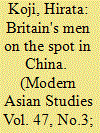

|
|
|
|
|
| Publication |
2013.
|
| Summary/Abstract |
In this paper I examine British policy towards the Yuan Shikai government in China between 1912 and 1914 through a consideration of the role of Britain's 'men on the spot' in China (i.e. British diplomats and bankers resident there). In doing so, I synthesize two bodies of literature that rarely interact: British imperial history and work by China historians. Three main elements shaped British policy in China: first, British policy-makers were determined to support Yuan Shikai's consolidation of power in China; second, in the making of its China policy, the Foreign Office relied heavily on Britain's men on the spot; and, finally, these men were anxious about the vulnerability of the Yuan Shikai government and were therefore manipulated to a certain extent by Chinese politicians. I suggest that British policy-makers were reacting to, rather than controlling, Chinese politics and that in this period collaboration with British imperialism was a rational choice for the Yuan Shikai government.
|
|
|
|
|
|
|
|
|
|
|
|
|
|
|
|
| 4 |
ID:
106506
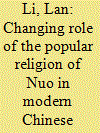

|
|
|
|
|
| Publication |
2011.
|
| Summary/Abstract |
Since the early 1980s, China's rapid economic growth and profound social transformation have greatly changed the role of popular religion in modern Chinese politics. In the case of nuo, these changes have been directly responsible for the incorporation of this popular religion into the implementation of Party-state's policy on ethnic minority and the provision of evidence to support the legitimacy of the Chinese Communist Party's regime. Through manipulation and reinterpretation by local governments, the popular religion of nuo has not only become the target of local socio-economic development, a common phenomenon in contemporary China, but has also played a key role in ethnic identification, which is an important step for a post-Mao's CCP to maintain political stability in ethnic minority areas. In addition, nuo has through the research of Marxism-influenced schools fundamentally altered its position from an officially unrecognized religion opposed to both socialist political order and atheist ideology to a politically favoured 'living fossil' of primitive culture. This proves the Marxist evolutionary theory in which socialism and communism are thought to be inescapable consequences of social development. The positive role played by nuo in modern Chinese politics has brought the popular religion much open support and endorsement from party-state officials at all levels, including top-ranking officials within the Central Committee of the CCP. Like any popular religion, nuo has over the centuries undergone significant changes, but never before has it experienced such dramatic changes in its relationship with an anti-religious and pragmatic central government, something which has significantly altered the course of its development.
|
|
|
|
|
|
|
|
|
|
|
|
|
|
|
|
| 5 |
ID:
160384
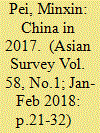

|
|
|
|
|
| Summary/Abstract |
Strongman rule returned to China in 2017 when Xi Jinping secured near-total political dominance. Repression remained intense while the Chinese economy performed reasonably well due to credit support. US–China relations are entering an uncertain phase. Strongman rule is likely to increase the risk of major policy mistakes and deliver few concrete achievements.
|
|
|
|
|
|
|
|
|
|
|
|
|
|
|
|
| 6 |
ID:
172457
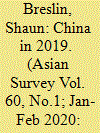

|
|
|
|
|
| Summary/Abstract |
In a year of considerable pomp and circumstance at home, China’s leaders continued to focus on how to deal with slowing economic growth, and the need for greater unity and support for the party (and Xi’s) priorities and goals. Despite efforts to persuade others of the global benefits of China’s rise, a number of key international actors seemed to increasingly think otherwise.
|
|
|
|
|
|
|
|
|
|
|
|
|
|
|
|
| 7 |
ID:
113698
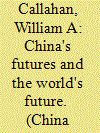

|
|
|
|
|
| Publication |
2012.
|
| Summary/Abstract |
China's growing economic, political, and cultural power is an important global issue; Chinese people are increasingly interested in thinking about their country's future as a world power. This article introduces the special issue 'China's futures - and the world's future' by discussing how futurology works in China. It argues that Chinese futures studies exhibit two general trends: (1) a shift from locating the future outside China to see China itself as the future, and (2) a shift from officials centrally planning the future to many different people dreaming about many different futures. The battle for the future thus is not necessarily between China and the West, but also takes place within the People's Republic of China amongst different groups of Chinese intellectuals. This Introduction examines themes that unite the special issue's diverse set of articles, especially the interplay between technical and cultural innovation. Studying the future here is important not because the forecasts are 'true'; more importantly, Chinese discussions of the future can tell us about how people in the PRC interact with their own past-present-future, and how they interact with people in other countries in the present.
|
|
|
|
|
|
|
|
|
|
|
|
|
|
|
|
| 8 |
ID:
102532
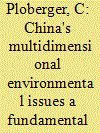

|
|
|
|
|
| Publication |
2011.
|
| Summary/Abstract |
China's environmental degeneration carries fundamental political, economic and social implications for its future development and its international reputation. The complexity of the challenge is underlined by the variety of environmental issues China is confronted with. Among them we can identify water shortage, desertification, industrial and urban air pollution, acid rain, and extreme weather patterns. China is already a major polluter and its growth focus as well as the rapid urbanization process we can observe will further increase the pressure on the environment. China's ability or inability of formulating an environmental friendly development strategy is of critical importance for its future development.
|
|
|
|
|
|
|
|
|
|
|
|
|
|
|
|
| 9 |
ID:
139639
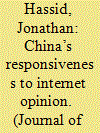

|
|
|
|
|
| Summary/Abstract |
Despite its authoritarian bent, the Chinese government quickly and actively moves to respond to public pressure over misdeeds revealed and discussed on the internet. Netizens have reacted with dismay to news about natural and man-made disasters, official corruption, abuse of the legal system and other prominent issues. Yet in spite of the sensitivity of such topics and the persistence of China’s censorship apparatus, Beijing usually acts to quickly address these problems rather than sweeping them under the rug. This paper discusses the implications of China’s responsiveness to online opinion. While the advantages of a responsive government are clear, there are also potential dangers lurking in Beijing’s quickness to be swayed by online mass opinion. First, online opinion makers are demographically skewed toward the relative “winners” in China’s economic reforms, a process that creates short-term stability but potentially ensures that in the long run the concerns of less fortunate citizens are ignored. And, second, the increasing power of internet commentary risks warping the slow, fitful – but genuine – progress that China has made in recent years toward reforming its political and legal systems.
|
|
|
|
|
|
|
|
|
|
|
|
|
|
|
|
| 10 |
ID:
131659
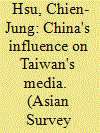

|
|
|
|
|
| Publication |
2014.
|
| Summary/Abstract |
The warming cross-Taiwan Strait relationship has allowed China greater opportunities to influence Taiwan's media. Three interrelated strategies-greater economic control over media outlets, pressure exerted on media owners, and the purchase of influential advertisements-have led to growing concerns about the erosion of press freedoms in Taiwan.
|
|
|
|
|
|
|
|
|
|
|
|
|
|
|
|
| 11 |
ID:
120815
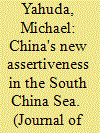

|
|
|
|
|
| Publication |
2013.
|
| Summary/Abstract |
China's new assertiveness in the South China Sea has arisen from the growth of its military power, its 'triumphalism' in the wake of the Western financial crisis and its heightened nationalism. The other littoral states of the South China Sea have been troubled by the opacity of Chinese politics and of the process of military decision-making amid a proliferation of apparently separately controlled maritime forces. The more active role being played by the United States in the region, in part as a response to Chinese activism, has troubled Beijing. While most of the ASEAN states have welcomed America as a hedge against growing Chinese power, their economies have become increasingly dependent upon China and they don't want to be a party to any potential conflict between these two giants. The problem is that there is no apparent resolution to what the Chinese call, in effect, these 'indisputable disputes'.
|
|
|
|
|
|
|
|
|
|
|
|
|
|
|
|
| 12 |
ID:
144642
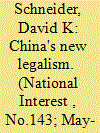

|
|
|
|
|
| Summary/Abstract |
HOW DOES culture shape politics? In her classic book Strategic Intelligence and Statecraft, Adda B. Bozeman argues that “American citizens must be fully aware of non-American approaches to statecraft if they are to render informed judgments on the merits or demerits of their own government’s foreign policies
|
|
|
|
|
|
|
|
|
|
|
|
|
|
|
|
| 13 |
ID:
134430
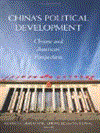

|
|
|
|
|
| Publication |
Washington, DC, Brookings Institution Press, 2014.
|
| Description |
xiii, 417p.Pbk
|
| Contents |
Includes bibliographical references and index
|
| Standard Number |
9780815725350
|
|
|
|
|
|
|
|
|
|
|
|
Copies: C:1/I:0,R:0,Q:0
Circulation
| Accession# | Call# | Current Location | Status | Policy | Location |
| 057932 | 320.951/LIE 057932 | Main | On Shelf | General | |
|
|
|
|
| 14 |
ID:
132868
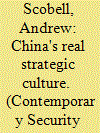

|
|
|
|
|
| Publication |
2014.
|
| Summary/Abstract |
The Great Wall is frequently held up as the most striking symbol of the potency of a persistent Chinese pacifist, non-expansionist, defence-minded strategic stance. But how accurate is this 'Great Wall' depiction of China's strategic culture? What is the impact of this depiction on China and the Asia-Pacific region? While the Great Wall is an apt symbol of a romanticized image of Chinese strategic culture, the reality behind the genesis of this impressive fortification and the accompanying pervasive belief in a monistic strategic tradition is that they are figments of the collective contemporary Chinese imagination. Nevertheless, these formidable myths exert real influence on two 'faces' of strategic culture. The first face refers to how leaders and society perceive the policies and actions of their own country. The second face, routinely neglected, refers to how leaders and society in one state perceive the policies and actions of an adversary or potential adversary state, which, like the first face, is constructed out of myth. The impact of these two faces on the Asia-Pacific region exacerbates the region's security dilemma, adversely impacting China's relations with other countries, notably Japan and the United States.
|
|
|
|
|
|
|
|
|
|
|
|
|
|
|
|
| 15 |
ID:
147401
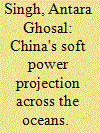

|
|
|
|
|
| Summary/Abstract |
At a time when the focus of most of the academic research on China is on the geopolitical developments in the South China Sea and the panning out of the United States' “next phase of rebalance strategy” in Asia, this paper draws attention to China's charm offensive across the Atlantic. It explores the political undertones of China's soft power push in the developed western world, especially in the context of its evolving relationship with the United States. In the final section, the paper tracks the implication of these developments on India and Indian policymaking.
|
|
|
|
|
|
|
|
|
|
|
|
|
|
|
|
| 16 |
ID:
127295
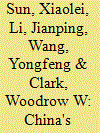

|
|
|
|
|
| Publication |
2014.
|
| Summary/Abstract |
Sovereign Wealth Funds (SWFs) are state-owned investment funds that invest in real and financial assets. Since the global financial crisis in 2008, SWFs' investments have resulted in national security concerns of host countries because SWFs continue to expand rapidly and have become increasingly active in real-time strategic transactions. Given this background, China, which has the biggest SWF in the world, is facing severe challenges of energy resources shortages while its plan is to accomplish social and economic development goals. Energy security is a key driving force of the energy investment policy of China's SWFs. This makes the SWF investments more complicated and more politically sensitive. The combination of sovereign rights and the strategic importance of energy also makes geopolitics more complicated and brings more uncertainty to SWF investments. This article explores the relationship between energy security and energy investments of China's SWFs. It is recognised that the energy investment of SWFs must follow a sustainable path to coordinate energy security, economic growth, return on investment and national security concerns. Government policymakers are urged to balance the financial and political returns on SWFs against potential negative effects. The conclusion presents insights for policymakers, energy scholars and SWF researchers.
|
|
|
|
|
|
|
|
|
|
|
|
|
|
|
|
| 17 |
ID:
092161
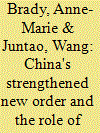

|
|
|
|
|
| Publication |
2009.
|
| Summary/Abstract |
The issue of whether or not the current regime in China is sustainable is one of the key questions of interest to specialists on Chinese politics today. The authors of this paper contend that the CCP government has actually strengthened its hold on power in recent years, rather than weakening it, as so many analysts predicted. The paper uses CCP propaganda work in the current era as a lens to consider why this might be so and utilizes the term 'Popular Authoritarianism' to describe China's new political order.
|
|
|
|
|
|
|
|
|
|
|
|
|
|
|
|
| 18 |
ID:
187026
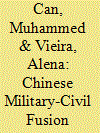

|
|
|
|
|
| Summary/Abstract |
An analysis of the Chinese military-civil fusion strategy through a neoclassical realist and state action theory perspective highlights that the advent of emerging technologies has opened up an unprecedented opportunity for states to amplify the extraction and mobilisation of resources, conducive to maintaining and increasing their military and economic power in global politics. Underpinned by increasing cooperation between the People’s Liberation Army and private companies as well as state-owned enterprises, the Chinese military-civil fusion strategy can be viewed as a comprehensive strategy of mobilisation and extraction (actively relying on state-driven technology advancement) that has especially drawn upon technology transfer and talent recruitment from abroad. In this regard, China has acted in line with the premises of state action theory.
|
|
|
|
|
|
|
|
|
|
|
|
|
|
|
|
| 19 |
ID:
130426
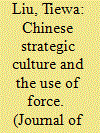

|
|
|
|
|
| Publication |
2014.
|
| Summary/Abstract |
This article reviews and explains Chinese attitudes towards the use of force in international affairs, especially from the perspective of strategic culture. The author traces back the traditional values which originated from ancient Chinese thoughts and also researches Mao Zedong's perception of war, which symbolizes the contemporary Chinese military strategic theory, and Deng Xiaoping and Hu Jintao's discourse on war thereafter, which represents the beliefs of the Chinese government after adopting the opening-up and reform policy. The case studies of the Korean War, the Vietnam War and the two Iraq Wars further explore the principles which dominate the diplomatic decision-making processes. The article concludes that China, in the predictable future, will still firmly adhere to the principles of state sovereignty, non-interference and non-use of force principles, while at the same time China will not hesitate to participate in the multilateral operations which are ratified with UN Security Council authorization and contribute increasingly to improving humanitarian situations due to its moral and political understanding of the use of force in international relations
|
|
|
|
|
|
|
|
|
|
|
|
|
|
|
|
| 20 |
ID:
184104
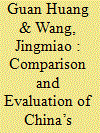

|
|
|
|
|
| Summary/Abstract |
The sustainability of China’s urban social security financing system has recently been seriously questioned. This article divides the financing system’s development into two periods (before and after reform). It compares the capital collection and the distribution and circulation structures and reviews the financing system before and after reform. In this study, we also discuss and explain the ‘empty account’ phenomenon, which severely undermines the financing system’s sustainability. We allege that the money accumulation system adopted after reform, which correlates personal accounts with the social pool, is not running as designed but as a ‘pay-as-you-go’ system. After evaluating the efficiency and cost performance of both periods, testing the financing system’s sustainability and correlating the system during both time periods with economic and social development, we find that the financing systems’ operation after reform corresponds with theories proved by case studies in other advanced states.
|
|
|
|
|
|
|
|
|
|
|
|
|
|
|
|
|
|
|
|
|